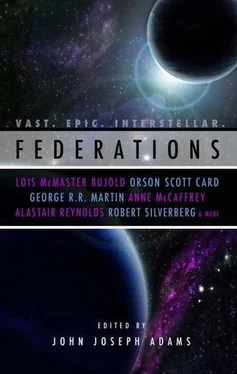Clever boy, thought Mazer. Deflect my anger to the IF. Make me his friend.
“However, the decision was made to send you only those letters that you would find encouraging. You’re being ‘handled,’ Admiral Rackham. But if you want all the letters, I’ll make sure you get the whole picture. It won’t make you happier, but at least you’ll know I’m not trying to manipulate you.”
“Oh, right,” said Mazer.
“Or at least I’m not trying to trick you,” said the computer. “I’m trying to persuade you by winning your trust, if I can, and then your cooperation. I will not lie to you or leave out information in order to deceive you. Tell me if you want all the letters or are content with the comfortable version of your family’s life.”
Mazer knew then that Graff had won—Mazer would have no choice but to answer, and no choice but to request the omitted letters. Then he would be beholden to the gitling. Angry, but in debt.
The real question was this: Was Graff staging the whole thing? Was he the one who withheld the un comfortable letters, only so he could gain points with Mazer for then releasing them?
Or was Graff taking some kind of risk, scamming the system in order to send him the full set of letters?
Or did Graff, a mere lieutenant, have a degree of power that allowed him to openly flout the orders of his superiors with impunity?
“Don’t send the bugger-off letter,” said Mazer.
“I already sent it and receipt has been confirmed.”
“I’m actually quite happy that you did that,” said Mazer. “So here’s my next message: Send the letters, gitling.”
Within a few minutes, the reply came, and this time the number of letters was much higher.
And with nothing else to do, Mazer opened them and began to read them silently, in the order they were sent. Which means that the first hundred were all from Kim.
The progression of the early letters was predictable, but no less painful to read. She was hurt, angry, grief-stricken, resentful, filled with longing. She tried to hurt him with invective, or with guilt, or by tormenting him with sexually charged memories. Maybe she was tormenting herself.
Her letters, even the angry ones, were reminders of what he had lost, of the life he once had. It’s not as if she invented her temper for this occasion. She had it all along, and he had been lashed by it before, and bore a few old scars. But now it all combined to make him miss her.
Her words hurt him, tantalized him, made him grieve, and often he had to stop reading and listen to something—music, poetry, or the drones and clicks of subtle machinery in the seemingly motionless craft that was hurtling through space in, the physicists assured him, a wavelike way, though he could not detect any lack of solidity in any of the objects inside the ship. Except, of course, himself. He could dissolve at a word, if it was from her, and then be remade by another.
I was right to marry her, he thought again and again as he read. And wrong to leave her. I cheated her and myself and my children, and for what? So I could be trapped here in space while she grows old and dies, and then come back and watch some clever young lad take his rightful place as commander of all the fleets, while I hover behind him, a relic of an old war, who lived out the wrong cliche. Instead of coming home in a bag for his family to bury, it was his family who grew old and died while he came back still… still young. Young and utterly alone, purposeless except for the little matter of saving the human race, which wouldn’t even be in his hands.
Her letters calmed down after a while. They became monthly reports on the family. As if he had become a sort of diary for her. A place where she could wonder if she was doing the right thing in her raising of the children—too stern, too strict, too indulgent. If her decisions could have a wrong outcome or a wrong motive, then she wondered constantly if she should have done it differently. That, too, was the woman he had known and loved and reassured endlessly.
How did she hold together without him? Apparently she remembered the conversations they used to have, or imagined new ones. She inserted his side of the conversation into the letters. “I know you’d tell me that I did the right thing… that I had no choice… of course you’d say… you always told me… I’m still doing the same old…”
The things that a widow would tell herself about her dead husband.
But widows could still love their husbands. She has forgiven me.
And finally, in a letter written not so long ago—last week ; half a year ago—she said it outright. “I hope you have forgiven me for being so angry with you when you divorced me. I know you had no choice but to go, and you were trying to be kind by cutting all ties so I could go on with life. And I have gone on, exactly as you said I should. Let us please forgive one another.”
The words hit him like three-g acceleration. He gasped and wept and the computer became concerned. “What’s wrong?” the computer asked. “Sedation seems necessary.”
“I’m reading a letter from my wife,” he said. “I’m fine. No sedation.”
But he wasn’t fine. Because he knew what Graff and the IF could not have known when they let this message go through. Graff had lied to him. He had withheld information.
For what Mazer had told his wife was that she should go on with life and marry again.
That’s what she was telling him. Somebody had forbidden them to say or write anything that would tell him that Kim had married another man and probably had more children—but he knew, because that’s the only thing she could mean when she said, “I have gone on, exactly as you said I should.” That had been the crux of the argument. She insisting that divorce only made sense if she intended to remarry, him saying that of course she didn’t think of remarrying now , but later, when she finally realized that he would never come back as long as she lived, she wouldn’t have to write and ask him for a divorce, it would already be done and she could go ahead, knowing that she had his blessing—and she had slapped him and burst into tears because he thought so little of her and her love for him that he thought she could forget and marry someone else…
But she had, and it was breaking his heart, because even though he had been noble about insisting on the divorce, he had believed her when she said she could never love any other man.
She did love another man. He was gone only a year, and she…
No, he had been gone three decades now. Maybe it took her ten years before she found another man. Maybe…
“I will have to report this physical response,” said the computer.
“You do whatever you have to,” said Mazer. “What are they going to do, send me to the hospital? Or—I know—they could cancel the mission!”
He calmed down, though—barking at the computer made him feel marginally better. Even though his thoughts raced far beyond the words he was reading, he did read all the other letters, and now he could see hints and overtones. A lot of unexplained references to “we” and “us” in the letters. She wanted him to know.
“Send this to Graff. Tell him I know he broke his word almost as soon as he gave it.”
The answer came back in a moment. “Do you think I don’t know exactly what I sent?”
Did he know? Or had he only just now realized that Kim had slipped a message through, and now Graff was pretending that he knew it all along…
Another message from Graff: “Just heard from your computer that you have had a strong emotional response to the letters. I’m deeply sorry for that. It must be a challenge, to live in the presence of a computer that reports everything you do to us, and then a team of shrinks try to figure out how to respond in order to get the desired result. My own feeling is that if we intend to trust the future of the human race to this man, maybe we ought to tell him everything we know and converse with him like an adult. But my own letters have to be passed through the same panel of shrinks. For instance, they’re letting me tell you about them because they hope that you will come to trust me more by knowing that I don’t like what they do. They’re even letting me tell you this as a further attempt to allow the building of trust through recursive confession of trickery and deception. I bet it’s working, too. You can’t possibly read any secret meanings into this letter.”
Читать дальше












